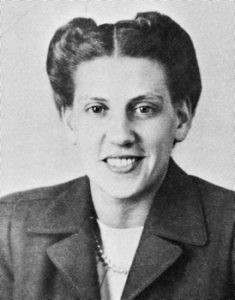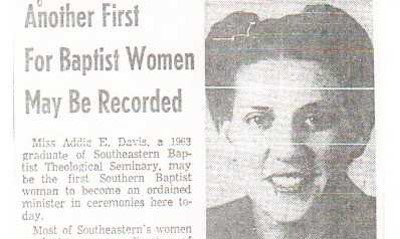Addie Davis made history in 1964 when she became the first woman to be ordained as a minister by a Southern Baptist church. Although she did receive her fair share of hate letters and calls for her to renounce her ordination, Davis’ ordination did not quickly lead to a movement of women requesting ordination. In fact, it would be another seven years before another woman would be ordained in a Southern Baptist Convention church.
Why was there such a varied response to Addie Davis’ ordination? And why was her ordination not even discussed at the 1965 Southern Baptist Convention in Dallas?

Allison Barbee
It appears the varied response is due to three aspects: the progressive reputation of the Watts Street Baptist Church who ordained her, the relatively moderate nature of the Southern Baptist Convention that had not yet experienced the fundamentalist takeover, and the broadcasting of the Civil Rights Movement that captivated American television screens for conservatives and progressives alike.
While Davis knew from a young age that she wanted to be a pastor, her path to ordination and her placement as the pastor of a church was not linear. In fact, her theological education was put off for 10 years when she was forced to return home to help her mother run the family store. However, once she enrolled in Southeastern Baptist Theological Seminary’s bachelor of divinity program (the precursor to today’s master of divinity degree) in 1960, she began to seek the career as a minister that she always had dreamed of.
In seminary, she showed promise and dedication to social justice through ministry. She took on the hotly contested topic of racism in her “Am I My Brother’s Keeper?” sermon and wrote a paper chronicling the attitudes of contemporary churches toward women’s ordination, where she noted that the SBC had yet to ordain a woman. It was this commitment to social justice in her ministry that would set the stage for her news-making ordination, even if others did not perceive it as such at the time.

Addie Davis
Watts Street Baptist Church’s reputation as a progressive and “maverick” church due to its already-strained relationship with the SBC made for a lack of reaction when the church ordained a woman. In fact, Watts Street received more backlash for allowing African Americans to attend their services and use meeting spaces than they did for ordaining a woman — the parsonage was bombed in the 1960s over the church’s progressive attitude on racism.
Following the recommendation of the church’s Women’s Missionary Society, Watts Street allowed six positions for women to serve on their board, although they lacked the women desiring the leadership positions until Davis would come along a few years later.
Additionally, the Civil Rights Movement might have played a much more significant role in the response to Davis’ ordination than has been previously thought. While Black Baptists were some of the first supporters and activists in the Civil Rights Movement, as the movement became more and more publicized, more white progressive Baptists began to speak out against the violence their Black brothers and sisters were subject to. That group included Warren Carr, pastor of Watts Street Baptist Church.
While anti-segregation was not the official stance of the SBC, the mid-1960s was marked by political change and the fight against segregation in many churches across the South. This preoccupation with the Civil Rights Movement could explain why Davis’ ordination was not met with more debate.
“This preoccupation with the Civil Rights Movement could explain why Davis’ ordination was not met with more debate.”
Finally, the nature of the SBC played a role too. The fundamentalist takeover marked by the election of Adrian Rogers to the presidency in 1979 would not occur for another 15 years after Davis’ ordination, and most of the debates surrounding women’s place in the SBC would not occur until the late-1970s and beyond. The issue of women’s ordination would not be formally settled by the SBC until exactly 20 years after Davis’ ordination with the SBC’s “Resolution on the Ordination and Role of Women in Ministry” published in 1984.
Addie Davis made history with her ordination in 1964. Her commitment and advice to “cherish the dream God has given you” has inspired women to pursue ordination, regardless of the stance of the convention or the backlash that may ensue. Although her ordination did not set off a wave of change immediately, certainly Davis has and will continue to be a role model for young women pursuing ministry.
It is important for congregations to nourish this call to ministry experienced by young women based on their personal merit and calling from God, not necessarily by the denominational rule book.
Allison Barbee is a student at Wingate University majoring in religious studies. She is interested in feminist biblical interpretation, early Christianity, and religious history. She hopes to attend graduate school for biblical studies and eventually become a professor.
Related articles:
Addie Davis, first woman ordained as Southern Baptist pastor, dies at 88
Baptist Women in Ministry celebrates 50th anniversary of first ordination
N.C. church, first to ordain a woman, calls its first female pastor

